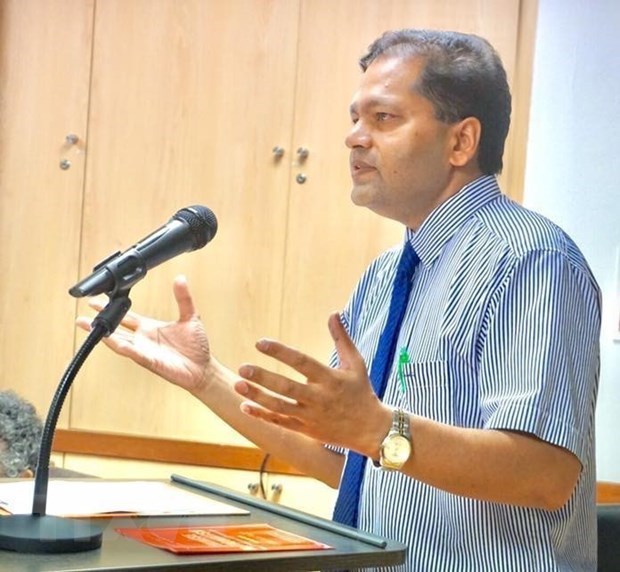ASEAN+3 Summit necessary for regional cooperation in addressing dual crisis: Thai experts
The ASEAN+3 Special Summit on COVID-19 Response on April 14 will bring in great opportunities for regional cooperation in dealing with an “unprecedented" dual crisis, said Thai experts.
 Dr. Robin Ramcharan (Photo: VNA)
Dr. Robin Ramcharan (Photo: VNA) Bangkok (VNA) - The ASEAN+3 Special
Summit on COVID-19 Response on April 14 will bring in great opportunities for
regional cooperation in dealing with an “unprecedented" dual crisis, said
Thai experts.
According to Dr. Robin Ramcharan, lecturer at the Webster University of Thailand and Executive Director of the Bangkok-based Asia Centre, COVID-19 has revealed itself to be not only a health crisis but also a crisis for development as supply chains are disrupted and international trade are disrupted.
“This health and developmental crisis poses a challenge to ASEAN’s purported goal of achieving the SDGs. In light of this, there have been calls for ASEAN to step up its response to this situation,” he said.
He said ASEAN has recognised these challenges and in early April announced several initiatives, including establishing a regional COVID-19 response fund, sharing information, and coordinating strategies to ease the impact of the crisis on the economy and the people. The need for peace and stability in the East Sea was discussed in discussions with China, Japan and the Republic of Korea.
“Individual ASEAN members, especially Singapore, have taken decisive action that has led to flattening the curve of infection. However, for future crises the speed of the reaction must be reviewed. An assessment must be made to whether faster action could have dramatically reduced the spread of the virus,” he noted.
According to Robin, the Summit must consider addressing a number of challenges within ASEAN and between it and its dialogue partners. These include the need for accurate information on the infection rate, for transparency, better functional cooperation, rapid reaction capacity, and preventing any outside interference in any decisive actions taken to contain the crisis.
Other measures for better future coordination include the possibility of a regional stockpile of medical supplies and equipment and engaging the defence sector in humanitarian responses, he said, adding this crisis brings an opportunity for ASEAN to improve its coordination through technological means, notably video-conferencing.
The Summit is vital not only for ASEAN centrality to regional politics and economics, but also for fostering better appreciation for each other’s approach to the Indo-Pacific concept.
This dialogue process has proven useful in managing affairs with external actors, especially big powers in order to preserve some balance of power in the region. The ASEAN Plus Three encourages intra-Asian multilateral cooperation, which has historically been absent. At this particular junction, medical cooperation through this forum should be of utmost priority.
Meanwhile, Dr. Thitinan Pongsudhirak, Director of the Institute of Security and International Studies (ISIS), said the Summit is expected to draw much attention, as China, the Republic of Korea and Japan have implemented effective measures to contain the COVID-19 pandemic.
He said, in the first outbreak in January, Southeast Asian countries seemed to have curbed the spread of the disease. Vietnam seemed to prepare to announce the end of the epidemic by the end of February. However, new infections have been rapidly increasing, with potential factors that can turn the disease into a crisis beyond the control of the region.
He said that this ASEAN+3 Special Summit is a very important event for ASEAN, in the context that the partner countries have many conditions to support this bloc.
In addition, Dr. Thitian stated that ASEAN's central role in the region is also under pressure, if the bloc cannot stabilize the situation and solve the crisis effectively.
If that happens, the COVID-19 pandemic will take away many of the achievements ASEAN has made over the past years. Therefore, this is a very important time that Vietnam in particular and ASEAN in general need to give priority to the fight against COVID-19, the ISIS leader said.
According to Robin, one can not ignore the fact that the health crisis has led to a grinding halt to ASEAN activities. Vietnam has guided ASEAN well during this crisis, including taking the responsible step of postponing the ASEAN summit until June 2020.
Vietnam has engaged in all channels of communication that are possible. It has guided a cohesive response by ASEAN through the ASEAN Chairman’s Statement on ASEAN Collective Response to the Outbreak of COVID-19. At the request of Vietnam, the ASEAN Coordination Council coordinated in Laos on February 20. It also proposed the creation of an ACC Working Group on Public Health Emergencies, which was adopted. Vietnam has also called for better sharing of information, improving relations between relevant national and regional agencies and strengthening international collaboration to address the crisis. It has kept its word in pursuing during its Chairmanship theme “Cohesive and Responsive ASEAN”.
Vietnam has been hailed for its exemplary handling of the crisis, given the much lower infection rate and no deaths. It announced strict measures much earlier than other parts of the region. Among the good measures are strict contact tracing to identify and isolate infected persons and their second and third-hand contacts, and a strict monitoring of suspected infections. As the second wave of the virus seems to be coming, Vietnam would do well to implement nation-wide testing, to the extent that it has the means to do so.
Meanwhile, Dr. Thitinan recommends that in the coming time, Vietnam needs to keep a close watch on the situation and effectively address the immediate challenges. At the same time, it should play the role of coordinating epidemic prevention and control in ASEAN and between the bloc and its partner countries, first of all in sharing information on best practices in disease prevention and treatment.
Vietnam has certain resources such as test kits that can be shared with or transferred to other countries in the region, he said, adding that the country also needs to rearrange all agendas of ASEAN, as well as other ASEAN-led frameworks such as the East Asia Summit, in the context of the COVID-19 pandemic./.
According to Dr. Robin Ramcharan, lecturer at the Webster University of Thailand and Executive Director of the Bangkok-based Asia Centre, COVID-19 has revealed itself to be not only a health crisis but also a crisis for development as supply chains are disrupted and international trade are disrupted.
“This health and developmental crisis poses a challenge to ASEAN’s purported goal of achieving the SDGs. In light of this, there have been calls for ASEAN to step up its response to this situation,” he said.
He said ASEAN has recognised these challenges and in early April announced several initiatives, including establishing a regional COVID-19 response fund, sharing information, and coordinating strategies to ease the impact of the crisis on the economy and the people. The need for peace and stability in the East Sea was discussed in discussions with China, Japan and the Republic of Korea.
“Individual ASEAN members, especially Singapore, have taken decisive action that has led to flattening the curve of infection. However, for future crises the speed of the reaction must be reviewed. An assessment must be made to whether faster action could have dramatically reduced the spread of the virus,” he noted.
According to Robin, the Summit must consider addressing a number of challenges within ASEAN and between it and its dialogue partners. These include the need for accurate information on the infection rate, for transparency, better functional cooperation, rapid reaction capacity, and preventing any outside interference in any decisive actions taken to contain the crisis.
Other measures for better future coordination include the possibility of a regional stockpile of medical supplies and equipment and engaging the defence sector in humanitarian responses, he said, adding this crisis brings an opportunity for ASEAN to improve its coordination through technological means, notably video-conferencing.
The Summit is vital not only for ASEAN centrality to regional politics and economics, but also for fostering better appreciation for each other’s approach to the Indo-Pacific concept.
This dialogue process has proven useful in managing affairs with external actors, especially big powers in order to preserve some balance of power in the region. The ASEAN Plus Three encourages intra-Asian multilateral cooperation, which has historically been absent. At this particular junction, medical cooperation through this forum should be of utmost priority.
Meanwhile, Dr. Thitinan Pongsudhirak, Director of the Institute of Security and International Studies (ISIS), said the Summit is expected to draw much attention, as China, the Republic of Korea and Japan have implemented effective measures to contain the COVID-19 pandemic.
He said, in the first outbreak in January, Southeast Asian countries seemed to have curbed the spread of the disease. Vietnam seemed to prepare to announce the end of the epidemic by the end of February. However, new infections have been rapidly increasing, with potential factors that can turn the disease into a crisis beyond the control of the region.
He said that this ASEAN+3 Special Summit is a very important event for ASEAN, in the context that the partner countries have many conditions to support this bloc.
In addition, Dr. Thitian stated that ASEAN's central role in the region is also under pressure, if the bloc cannot stabilize the situation and solve the crisis effectively.
If that happens, the COVID-19 pandemic will take away many of the achievements ASEAN has made over the past years. Therefore, this is a very important time that Vietnam in particular and ASEAN in general need to give priority to the fight against COVID-19, the ISIS leader said.
According to Robin, one can not ignore the fact that the health crisis has led to a grinding halt to ASEAN activities. Vietnam has guided ASEAN well during this crisis, including taking the responsible step of postponing the ASEAN summit until June 2020.
Vietnam has engaged in all channels of communication that are possible. It has guided a cohesive response by ASEAN through the ASEAN Chairman’s Statement on ASEAN Collective Response to the Outbreak of COVID-19. At the request of Vietnam, the ASEAN Coordination Council coordinated in Laos on February 20. It also proposed the creation of an ACC Working Group on Public Health Emergencies, which was adopted. Vietnam has also called for better sharing of information, improving relations between relevant national and regional agencies and strengthening international collaboration to address the crisis. It has kept its word in pursuing during its Chairmanship theme “Cohesive and Responsive ASEAN”.
Vietnam has been hailed for its exemplary handling of the crisis, given the much lower infection rate and no deaths. It announced strict measures much earlier than other parts of the region. Among the good measures are strict contact tracing to identify and isolate infected persons and their second and third-hand contacts, and a strict monitoring of suspected infections. As the second wave of the virus seems to be coming, Vietnam would do well to implement nation-wide testing, to the extent that it has the means to do so.
Meanwhile, Dr. Thitinan recommends that in the coming time, Vietnam needs to keep a close watch on the situation and effectively address the immediate challenges. At the same time, it should play the role of coordinating epidemic prevention and control in ASEAN and between the bloc and its partner countries, first of all in sharing information on best practices in disease prevention and treatment.
Vietnam has certain resources such as test kits that can be shared with or transferred to other countries in the region, he said, adding that the country also needs to rearrange all agendas of ASEAN, as well as other ASEAN-led frameworks such as the East Asia Summit, in the context of the COVID-19 pandemic./.












